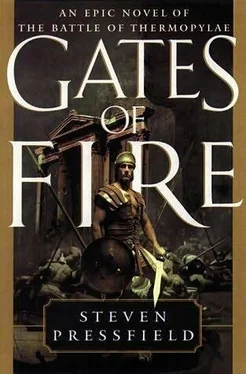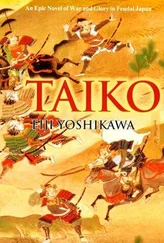Steven Pressfield - Gates of Fire - An Epic Novel of the Battle of Thermopylae
Здесь есть возможность читать онлайн «Steven Pressfield - Gates of Fire - An Epic Novel of the Battle of Thermopylae» весь текст электронной книги совершенно бесплатно (целиком полную версию без сокращений). В некоторых случаях можно слушать аудио, скачать через торрент в формате fb2 и присутствует краткое содержание. Жанр: Историческая проза, на английском языке. Описание произведения, (предисловие) а так же отзывы посетителей доступны на портале библиотеки ЛибКат.
- Название:Gates of Fire: An Epic Novel of the Battle of Thermopylae
- Автор:
- Жанр:
- Год:неизвестен
- ISBN:нет данных
- Рейтинг книги:3 / 5. Голосов: 1
-
Избранное:Добавить в избранное
- Отзывы:
-
Ваша оценка:
- 60
- 1
- 2
- 3
- 4
- 5
Gates of Fire: An Epic Novel of the Battle of Thermopylae: краткое содержание, описание и аннотация
Предлагаем к чтению аннотацию, описание, краткое содержание или предисловие (зависит от того, что написал сам автор книги «Gates of Fire: An Epic Novel of the Battle of Thermopylae»). Если вы не нашли необходимую информацию о книге — напишите в комментариях, мы постараемся отыскать её.
Gates of Fire: An Epic Novel of the Battle of Thermopylae — читать онлайн бесплатно полную книгу (весь текст) целиком
Ниже представлен текст книги, разбитый по страницам. Система сохранения места последней прочитанной страницы, позволяет с удобством читать онлайн бесплатно книгу «Gates of Fire: An Epic Novel of the Battle of Thermopylae», без необходимости каждый раз заново искать на чём Вы остановились. Поставьте закладку, и сможете в любой момент перейти на страницу, на которой закончили чтение.
Интервал:
Закладка:
Now the slaughter in the forefront became man-to-man, with only the wildest semblance of rank and formation. The Spartans slew belly-to-belly with the murderously efficient thrust-and-draw of their short xiphos swords. I saw Alexandras, his shield torn from his grip, plunging his xiphos into the face of a Mede whose hands clawed and pounded at Alexandras' groin.
The middle-rankers of the Lakedaemonians surged into this bedlam, spears and shields still intact. But the Medes' capacity for reinforcement seemed limitless; above the fray, one could glimpse the next thousand reinforcements thundering into the Narrows like a flood, with more myriads behind, and yet more after that. Despite the catastrophic magnitude of their casualties, the tide began to flow in the enemy's favor. The weight of their masses alone began to buckle the Spartan line. The only thing that stopped the foe from swamping the Hellenes outright was that they couldn't get enough men through the Narrows quickly enough; that, and the wall of Median bodies that now obstructed the confines like a landslide.
The Spartans fought from behind this wall of flesh as if it were a battlement of stone. The enemy swarmed atop it. Now we in the rear could see them; they became targets. Twice Suicide drilled javelins right over Alexandras' shoulder into Medes lunging at the youth from atop the mound of corpses. Bodies were underfoot everywhere. I mounted atop what I thought was a stone, only to feel it writhe and wriggle beneath me. It was a Mede, alive. He plunged the stub end of a shattered machaera scimitar three inches into my calf; I bellowed in terror and toppled into the tangle of other gore-splattered limbs. The foe came at me with his teeth. He seized my arm as if to tear it from its socket; I punched him in the face with my bow still in my grip. Suddenly a foot planted itself massively upon my back. A battle-axe fell with a grisly swoosh; the enemy's skull split like a melon. What are you looking for down there? a voice bellowed. It was Akanthus, Polynikes' squire, spray-blasted with blood and grinning like a madman.
The enemy flooded over the wall of bodies. By the time I got to my feet I had lost sight of Dienekes; I couldn't tell which platoon was which or where my proper station was. I had no idea how long we had been in the fight. Was it two minutes or twenty? I had two spears, spares, lashed to my back, their iron sheathed in leather so that, should I tumble accidentally, the spearpoints would work no harm to our comrades. Every other squire bore the same burden; they were all as scrambled as I was.
Up front you could hear the Median lancers' shafts snapping as they clashed and shivered against the Spartan bronze.
The Spartans' eight-footers made a different sound than the shorter, lighter lances of the foe. The flood was working against the Lakedaemonians, not from want of valor, but simply in consequence of the overwhelming masses of men which the enemy flung into the teeth of the line. I was frantic to locate Dienekes and deliver my spares. The scene was chaos. I could hear breakdowns right and left and see the rear-rankers of the Spartans buckling as the files before them gave way beneath the weight of the Median onslaught. I had to forget my master and serve where I could.
I dashed to a point where the line was thinnest, only three deep and beginning to swell into the desperate inverse bulge that precedes an out-and-out break. A Spartan fell backward amid the maw of slaughter; I saw a Mede lop the warrior's head clean off with a thunderous slash of a scimitar. The skull toppled, helmet and all, severed from its torso and rolling in the dust, with the marrow gushing and the bone of the spine showing grayish white and ghastly. Helmet and head vanished amid a storm of churning greaves and shod and unshod feet. The murderer loosed a cry of triumph, raising his blade to heaven; half an instant later a crimson-clad warrior buried an eight-footer so deep in the foeman's guts that its killing steel burst free, clear out the man's back.
I saw another Mede pass out in terror. The Spartan couldn't haul the weapon back out, so he broke it right off, planting his foot on the still-living enemy's belly and snapping the ash shaft in two. I had no idea who this hero was, and never did find out.
Spear! I heard him bellow, the hellish eye sockets of his helmet spinning to the rear for relief, for a spare, for anything to call to hand. I tore both eight-footers off my back and thrust them into the unknown warrior's hands. Backward. He seized one and whirled, planting it with both hands into another Mede's throat, butt-spike-first. His shield's gripcord had been severed or snapped from within; the aspis itself had fallen to the dirt. There was no room to retrieve it.
Two Medes lunged toward the Spartan with lances leveled, only to be intercepted by the massive bowl of his rankmate's shield, dropping into place to defend him. Both enemy lances snapped as their heads drove against the bronze facing and oak bowlwork of the shield. In the rush, their momentum carried them forward, sprawling onto the ground atop and tangled with the first Spartan. He drove his xiphos into the first Mede's belly, rose with a cry of homicide and slashed the second hilt-deep across both eyes. The enemy clutched his face in horror, blood gushing between the fingers of his clenched and clawing hands. The Spartan seized with both hands his own fallen shield and brought its rim down like an onion chopper, with such force upon the enemy's throat that it nearly decapitated him.
Re-form! Re-form! I heard an officer shouting. Someone shoved me aside from behind. In an instant other Spartans, from another platoon, surged forward, reinforcing the membrane-thin front which teetered at the brink of buckling. This was fighting scrambled. It stopped the heart to behold the gallantry of it. In moments, what had been a situation at the brink of catastrophe was transformed by the discipline and order of the reinforcing ranks into a strong-point, a fulcrum of vantage. Each man who found himself in the fore, no matter what rank he had held in formation, now assumed the role of officer. These closed ranks and lapped shields, shadow-toshadow. A wall of bronze rose before the scrambled mass, buying precious instants for those who found themselves in the rear to re-form and remarshal, surging into position in second, third, fourth ranks, and take on that station's role and rally to it.
Nothing fires the warrior's heart more with courage than to find himself and his comrades at the point of annihilation, at the brink of being routed and overrun, and then to dredge not merely from one's own bowels or guts but from one's own discipline and training the presence of mind not to panic, not to yield to the possession of despair, but instead to complete those homely acts of order which Dienekes had ever declared the supreme accomplishment of the warrior: to perform the commonplace under far-from-commonplace conditions. Not only to achieve this for oneself alone, as Achilles or the solo champions of yore, but to do it as part of a unit, to feel about oneself one's brothers-in-arms, in an instance like this of chaos and disorder, comrades whom one doesn't even know, with whom one has never trained; to feel them filling the spaces alongside him, from spear side and shield side, fore and rear, to behold one's comrades likewise rallying, not in a frenzy of mad possession-driven abandon, but with order and self-composure, each man knowing his role and rising to it, drawing strength from him as he draws it from them; the warrior in these moments finds himself lifted as if by the hand of a god. He cannot tell where his being leaves off and that of the comrade beside him begins. In that moment the phalanx forms a unity so dense and all-divining that it performs not merely at the level of a machine or engine of war but, surpassing that, to the state of a single organism, a beast of one blood and heart.
Читать дальшеИнтервал:
Закладка:
Похожие книги на «Gates of Fire: An Epic Novel of the Battle of Thermopylae»
Представляем Вашему вниманию похожие книги на «Gates of Fire: An Epic Novel of the Battle of Thermopylae» списком для выбора. Мы отобрали схожую по названию и смыслу литературу в надежде предоставить читателям больше вариантов отыскать новые, интересные, ещё непрочитанные произведения.
Обсуждение, отзывы о книге «Gates of Fire: An Epic Novel of the Battle of Thermopylae» и просто собственные мнения читателей. Оставьте ваши комментарии, напишите, что Вы думаете о произведении, его смысле или главных героях. Укажите что конкретно понравилось, а что нет, и почему Вы так считаете.












